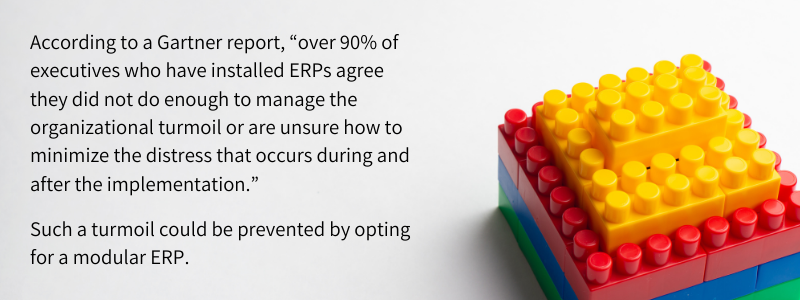Why Should you Opt for a Modular ERP?
A modular ERP is a huge relief from a cost perspective as it would allow you to go live, module by module. You would not be required to empty your coffers by paying for the whole system at once. By spreading the cost over time, you would have a clearer picture about your organization’s adaptability to the business modules in ERP and make tweaks and adjustments to suit your needs.
It is also suitable if you run a two-tier organization where you could deploy the complete ERP for the parent company while the subsidiary company could use specific types of ERP modules for its defined area of operations.
Slow adaptation is one of the major reasons why ERP deployments fail in generating the expected ROI. According to a Gartner report, “over 90% of executives who have installed ERPs agree they did not do enough to manage the organizational turmoil or are unsure how to minimize the distress that occurs during and after the implementation.”
The stage-wise deployment of business modules in ERP would mean lesser burden and faster adoption rates among the users, thus improving the ERP success rate significantly.
Although many cloud ERP systems could only be deployed as stand-alone and full-fledged solutions, Focus Softnet provides complete freedom to businesses to cherry pick modules even in cloud ERP deployment.
The 5 Major Modules of ERP your Business Can’t Do Without
The relevance of an ERP module depends on the type of business you operate. If you are into manufacturing and production, a robust material management module in ERP would be crucial, along with quality control and other relevant modules.
If your business offers services, you will have to be on the lookout for an ERP that is equipped with a truly advanced and modern CRM module. In the following, we briefly discuss the major modules of ERP that are needed by any business, regardless of their type of operations.
Accounting and finance
Gone are the days when you had no choice but to depend on a separate accounting software to manage and track your finances. Modern ERP systems are not only equipped with intuitive accounting systems but also include added tools to provide you with smart insights related to financial reporting.
Advanced features to effectively manage accounts payable, accounts receivable, general ledger and cash flow could be counted among the pre-requisites for a modern ERP accounting module. A distinctive advantage of using an in-built financial accounting module in the ERP system is that you could integrate sales data in real-time and have the most up-to-date picture of your company’s financial standing at any given point of time.

Customer relationship management (CRM)
A Customer Relationship Management (CRM) module is the backbone of your sales, marketing and service operations as it organizes all customer data and sustains a brimming sales funnel, high-performing campaigns and efficient service. While all ERP systems have inbuilt CRM modules, many businesses find out that the module is either not expansive enough to cater to all their business needs or is too complicated for effective usage.
Your ERP system should be loaded with a next-gen CRM module that does much more than a traditional CRM software. It should provide you with data analytics and reports to gauge customer behavior, buying patterns, satisfaction levels and more.
Human capital management (HCM)
You might have an army of robots moving around your warehouse, but you would still need humans to watch over them. A full-fledged HR module not only provides you with numerous tools to automate all aspects of workforce management, but it also integrates the payroll function with attendance and time sheets so that your HR team won’t spend time crunching numbers on spreadsheets.
Inventory and storage management
Managing your inventory entails much more than moving the stock in and outside your warehouse. With ongoing market uncertainty, it is vital that your ERP’s inventory and warehouse management module not only provides you with clear information about your current stock but also predicts future market demand. The inventory management module should also include tools to manage storage space efficiently for optimum utilization.
Enterprise asset management
Get the most out of your assets by ensuring their timely maintenance. With an enterprise asset management module, you could schedule maintenance, optimize production jobs adjusted to asset capacity, and make sure that the safety of your employees is not compromised. The automated depreciation feature would further help in retiring assets at the right time so that product quality is not hampered.
4 Additional ERP Factors to Take into Consideration
The following factors are a must-have in an ERP solution as they would allow you to get the most out the application.
Scalability – So that you won’t have to switch to another application
The ERP software you opt for should be scalable so that as your business grows, you would not be hard-pressed to search for a new system to accommodate new units and operations. Using an ERP with scalability limitations could seriously hamper your growth. Even if you manage to procure an additional business application, using two disparate systems is a recipe for disaster. Therefore, make sure the ERP you choose could be scaled up (or down) depending on your requirements.
Cross-module integration – To avoid data duplication and silos
Even though deploying modules separately may make them appear as stand-alone solutions, it is essential that they are fully integrated so that data could be shared and accessed across all teams. Limitations in cross-module integrations would result in data duplication and formation of data silos, defeating the core purpose of ERP.
3rd party integrations – So that you can get the best out of the ERP
Make sure the ERP enables you to integrate and connect with 3rd party applications, especially global applications that are widely used. These integrations would let you reap added benefits of their specific features. It would also make communication smoother and collaboration easier for your teams.
Mobile readiness – To enable anytime ERP access
While most of the ERP applications today are mobile enabled, it is important that the mobile accessibility is not limited to specific modules or features. Your ERP should empower you to view business reports, measure performance and take decisions on the go.
Conclusion – The Choice Matters!
The success or failure of an ERP implementation depends on various factors. However, post-implementation, the pace at which an ERP is accepted in terms of usage and how quickly it generates ROI is largely dependent on what modules were deployed and how well they cater to the business requirements.
Since the last 28+ years, Focus Softnet has been leading companies from the time and resource-consuming manual processes towards the freedom of business process automation and digital transformation. Our ERP systems are empowered with advanced Business Intelligence (BI) modules that could provide you with multi-dimensional view over your operations. We currently support businesses in 17 countries across the globe, with a user base that has surpassed a million.
If you would like to connect with our ERP specialists to discuss your business challenges, just fill the form and we would be glad to talk to you!








